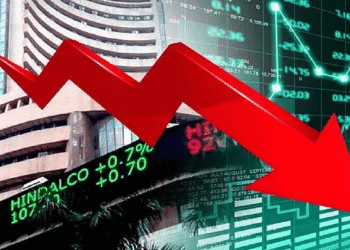Global cues, weak investor sentiment, and persistent foreign fund withdrawals weigh heavily on Indian equities
MUMBAI I Economy India : In a continuation of bearish sentiment in the Indian stock markets, benchmark indices BSE Sensex and NSE Nifty opened lower on Tuesday, dragged down by investor concerns over the unresolved India-US trade agreement and sustained selling by foreign institutional investors (FIIs).
The BSE Sensex opened at 80,620.25, marking a decline of 270.77 points, while the broader NSE Nifty slipped by 71.25 points to trade at 24,609.65 during early session deals.

India-US Trade Deal Delays Trigger Caution
Market participants are closely watching developments surrounding the anticipated trade agreement between India and the United States. Despite diplomatic efforts, uncertainty remains over key tariff structures, particularly in the information technology and pharmaceutical sectors. Analysts suggest that the absence of concrete progress is fueling anxiety in the markets.
“Until we see a decisive breakthrough in trade negotiations, markets are likely to remain under pressure,” said Vivek Mahajan, Head of Research at Reliance Securities.
Foreign Fund Outflows Continue to Mount
The pressure on equities is also being compounded by persistent foreign institutional investor (FII) withdrawals. According to provisional exchange data, FIIs have pulled out over Rs8,400 crore in the last week alone. This trend reflects global risk aversion amid concerns over U.S. monetary policy, global inflation, and a possible delay in rate cuts by the Federal Reserve.
Weak Global Sentiment and Earnings Misses
Adding to the woes, global markets are trading mixed as investors weigh disappointing Q2 earnings reports from some multinational corporations. Back home, quarterly results from several Indian blue-chip companies have failed to impress. The Nifty 50’s forward Price-to-Earnings (P/E) ratio has also stretched beyond historical averages, signaling potential overvaluation.

IT and Banking Stocks Lead Declines
Information technology and banking sectors bore the brunt of the selling pressure. Heavyweights like Infosys, Wipro, and HDFC Bank were among the top drags on the indices. The IT index has been particularly volatile amid concerns over U.S. tariff retaliation and shrinking global tech budgets.
Market Experts Warn of Further Volatility
Technical analysts caution that the markets could face further downside unless key support levels hold. “Nifty must remain above 24,500 to avoid a deeper correction,” said Sudip Shah, Technical Head at SBI Securities. “If breached, we may test 24,200 in the near term.”
India VIX Rises — A Signal of Growing Nervousness
India’s volatility index, India VIX, jumped by 7.2%, indicating growing investor nervousness. A higher VIX generally correlates with rising volatility and investor fear, suggesting that traders are bracing for sharp market moves ahead.
LIC and Other Institutions See Valuation Erosion
The market slump is also impacting institutional investors. Reports indicate that the Life Insurance Corporation of India (LIC) has witnessed an erosion of nearly Rs46,000 crore in the value of its equity holdings in July alone.
Sectors to Watch
While most sectors traded in red FMCG and Healthcare offered some defensive support. Analysts expect Pharma, Consumer Durables, and FMCG to be relatively resilient in the coming weeks due to strong fundamentals and stable earnings outlooks.
Outlook Remains Cautious
Overall, the market sentiment remains cautious. In the absence of a clear catalyst—be it a trade breakthrough, earnings surprise, or dovish central bank move—the current downtrend is expected to persist.
(Economy India)














